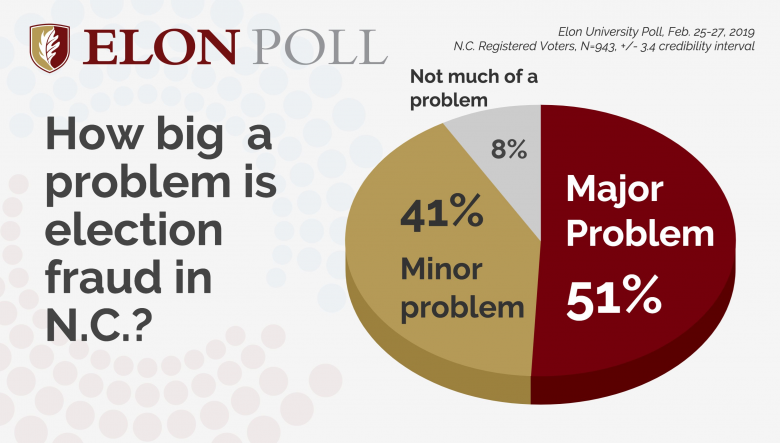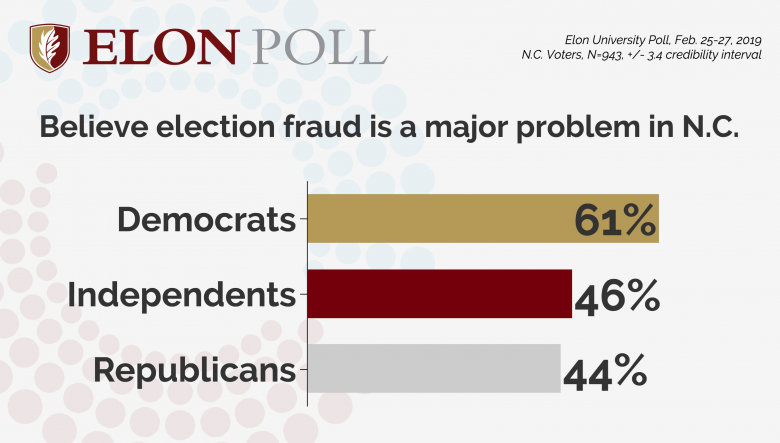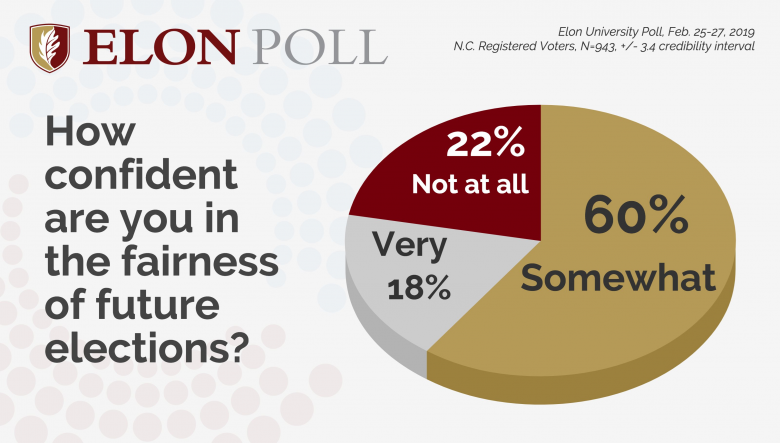The Elon University Poll conducted a survey following a recent decision to hold a new election in North Carolina’s 9th Congressional District, with one in five voters saying they are ‘not at all confident’ in the fairness of future elections.
Following a Congressional race marked by allegations of misconduct and criminal charges, half of North Carolina voters say election fraud is a “major problem” in the state, the Elon University Poll has found.
The survey was conducted shortly after the N.C. Board of Election’s Feb. 21 decision to order a new election in the 9 Congressional District. That ruling came after days of testimony outlining allegations that a GOP operative now facing criminal charges had tampered with absentee ballots. Republican Mark Harris, who had apparently won the election over Democrat Dan McCready by a narrow margin, now says he will not run in the new election. Against this backdrop, about one in five N.C. voters say they are “not at all confident” future elections will be fair, the poll found.
“Now months out from the tainted 9 District election, North Carolina voters are broadly skeptical of elections in the state,” said Jason Husser, director of the Elon Poll and associate professor of political science. “A majority of the electorate has clear concerns about the fairness of future elections and the extent of fraud.”

The 9 District race is the only unresolved Congressional race from the Nov. 6 election, with the outcome gaining national interest following the discovery of voting irregularities. Testimony before the N.C. State Board of Elections generated coverage from local, state and national outlets.
Amid the widespread coverage, the survey found that nearly 60 percent of N.C. voters followed the coverage “somewhat closely” or “very closely,” with those who followed the controversial election “very closely” much more likely to say that election fraud is a “major problem.” Asked whether Harris should run in the new election, 60 percent said he should not, while 23 percent said he should run again, the poll found.
The survey of 943 N.C. voters was conducted Feb. 24-27, 2019, with respondents contacted by email. For this survey, the Elon Poll used an online opt-in sample, with respondents receiving small amounts of compensation in exchange for their opinions. The survey has a credibility interval of +/- 3.4 percent. Different from the margin of error, the credibility interval is used to measure the accuracy of nonprobability surveys such as an opt-in online polls. A fuller explanation of the credibility interval and the survey methodology are available in the full report.
Election fraud
Allegations of misconduct in the district came during an election in which fraud was already on the minds of many N.C. voters. The ballot on Nov. 6, 2018, asked voters to weigh in on a new state constitutional amendment that would require a photo identification to cast a ballot, with advocates saying such a measure was needed to combat fraud and ensure the integrity of elections. That amendment was approved by voters, but a Wake County Superior Court judge recently ruled the amendment was unconstitutional.
Asked about the issue of election fraud, half of N.C. voters told the Elon Poll it was a “major problem,” while another 41 percent said it was a “minor problem.” Only 8 percent said it was “not much of a problem at all.”

Responses varied greatly along party and racial lines. Sixty-one percent of Democrats said election fraud was a “major problem,” compared to 46 percent of independents and 44 percent of Republicans. Black voters and other minority voters were much more likely to say it was a “major problem” than white voters.
Those who paid more attention to the 9 District scandal were much more likely to be concerned about the problem of election fraud. Among those who followed the 9 District race very closely, 62 percent said election fraud is a “major problem.” Just 37 percent of those who did not follow the scandal saw election fraud as a “major problem.”
“Visible integrity in the upcoming election cycle will be essential for voter confidence in the democratic process,” Husser said.
Confidence in Elections
About 60 percent of N.C. voters say they are “somewhat confident” in the fairness of future elections now, compared to the 22 percent who are “not at all confident” and 18 percent who are “very confident” that future elections will be fair.
Party and racial differences were also apparent in the responses, but were less drastic. Generally speaking, Republicans were more likely to have confidence in the fairness of future elections, while Democrats, independents and minority voters were less likely to express that confidence. Men were more generally confident in the fairness of future elections than women, and those who paid less attention to the 9 District controversy were more likely to be confident future elections would be fair.

A new election
Now that it has ordered a new election to be held, the N.C. State Board of Elections will set a date for a new primary election at a future board meeting. However, Republican Mark Harris has said his name will not appear on the ballot.
Harris announced Feb. 26 that he won’t be running again, with that decision announced after the Elon Poll had begun surveying voters. Asked whether they thought Harris should run again or stay out of the race, 60 percent of voters say he should not be a candidate again. A third of Republicans said he should run again, compared to 19 percent of independents and 17 percent of Democrats. Democrats and independents were much more likely than Republicans to believe Harris should not run again, with 70 percent of Democrats and 62 percent of independents saying he should stay out, compared to 46 percent of Republicans.


